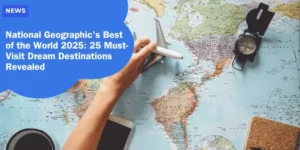Unlock This Expert Tip for a Cost-Effective and Stress-Free Summer Getaway

Life is full of compromises, and that adage has never been more true than when you’re traveling this summer.
The skies and roads will be bustling like never before.
Just before Memorial Day, the Transportation Security Administration set a new record by screening nearly 3 million passengers on May 24, surpassing the previous record set last Thanksgiving.
Meanwhile, U.S. airlines anticipate a record-breaking summer, with projections to carry 271 million passengers in June, July, and August, reflecting a 6% increase from the previous summer.
So, how can a savvy traveler navigate these packed conditions and high prices?
The secret lies in flexibility.
Bill Smith, CEO of Landing, a company specializing in flexible rentals, advises, “Given peak season prices, crowds, flight delays, and other uncertainties, it’s wise to keep your itinerary in pencil, not pen.”
Remaining adaptable not only minimizes travel expenses but also maximizes your adventure.
In this article, we will explore several strategies to enhance your flexibility during the busiest travel season, ensuring you can enjoy a stress-free and budget-friendly summer getaway.
Ways to Become More Flexible This Summer
Fly to Another City
Sometimes the destination you have in mind might be too popular—and therefore, too expensive.
Last summer, Phil Strazzulla encountered this when he attempted to visit Milan.
Airline tickets were exorbitantly priced, costing over $1,000.
Instead, he opted to fly to nearby Zurich, which saved him more than $300 per ticket.
“The drive over the mountains was spectacular,” Strazzulla, who runs a software review company, recalls.
Go Off the Beaten Path
Flexibility also means being willing to explore less conventional destinations.
Instead of heading to popular tourist spots like Rome, Italy, Lynna Goldsby, a cruise planner with Travel With Lynna, suggests visiting the Puglia region.
Rather than London, consider Normandy or Bath.
These alternate locations can satisfy your travel aspirations while reducing expenses on lodgings, restaurants, tours, and transfers.
Take a Detour
Often, airfares can be less expensive if you fly through an airline’s hub en route to your final destination.
Linda Robert, a travel coach with Back in the Groove Again, highlights how airlines such as Icelandair, Qatar Airways, and Copa offer stopover programs, allowing you to spend a day or two at their hubs before continuing to your destination at no additional cost.
Here Are a Few Useful Flexibility Tools
Beyond mindset and strategy, there are practical tools that can aid in flexible travel planning.
For instance, Landing, a favorite among digital nomads and location-independent workers, recently introduced its 12-month Flex Stay program.
This initiative allows renters to save up to 30% on monthly rates by committing to a year of living with Landing, which has locations in over 375 cities.
“Members are free to move around our nationwide network of fully furnished apartments as much—or as little—as they wish throughout the year,” Smith explains.
Another useful tool is Airbnb’s flexible dates search, introduced during the pandemic.
This feature lets users select a range of dates instead of fixed ones, potentially saving up to 20% on vacation rental costs.
Additionally, familiar online travel sites like Google Flights and Kayak offer the ability to search for flights and hotel rates based on a flexible schedule.
Pro tip: Don’t limit your search to specific dates; consider also being flexible with your destination by choosing a broader region or alternate airports.
Financial Flexibility
Being financially flexible can also provide substantial savings.
Mahmood Khan, a hospitality and tourism professor at Virginia Tech, notes that hotels often reduce their rates by about 20% if you pay upfront.
Just be sure that your travel plans are firm, as these discounted rates are typically nonrefundable.
Strategies for Increased Travel Flexibility
Increasing travel flexibility involves more than just changing your destination or travel dates; it’s about incorporating fluidity into your entire trip planning process.
Incorporate White Space into Your Itinerary
Stephanie Chastain, owner of Infinite Ireland Travel, suggests inserting “white space” into your itinerary.
This means allowing for blocks of free time in your schedule.
“A schedule that is too rigid can make travelers susceptible to disruptions that can derail their plans,” Chastain advises.
Examples include leisurely breakfasts, rest days every two or three days, and afternoons with no planned activities, providing wiggle room to manage unexpected delays or detours.
Adapt and Save
Even travel experts continue to learn about the importance of flexibility.
For instance, when I recently needed to travel from Anguilla to Miami at the last minute, the direct flights were prohibitively expensive—around $800 for a one-way ticket.
Upon considering alternatives, I realized that Anguilla is just a short ferry ride from St. Martin, which offers many more flights.
Shifting my departure saved $200 on the airfare.
Embrace a Different Travel Mindset
Susan Sherren, who operates Couture Trips, recommends adjusting your expectations to remain adaptable.
“Life isn’t perfect,” she says, noting that unexpected events will likely arise during your trip.
Understanding that and planning accordingly helps you bend without breaking under the pressures of travel.
Conclusion: Balance Flexibility with Enjoyment
While it’s crucial to remain flexible, it’s also essential not to over-compromise.
Aim to book flights on weekdays to avoid high fares, utilize flexible fare features on travel sites like Google Flights or Kayak, and consider programs like Landing’s new flex stay offering.
However, too many compromises can diminish your vacation experience.
Avoid settling for subpar accommodations far from the attractions you wish to visit.
Being flexible yet prudent allows you to enjoy a well-balanced and fulfilling getaway.
Call to Action
As you plan your summer vacation, remember the expert advice shared here: stay flexible, seek alternate routes, explore less-traveled paths, and utilize tools designed to enhance your travel adaptability.
By doing so, not only will you save money, but you will also enrich your travel experience.
To maximize your next adventure, start planning with flexibility and an open mind.
Happy travels, and may your summer be filled with memorable and stress-free adventures!






